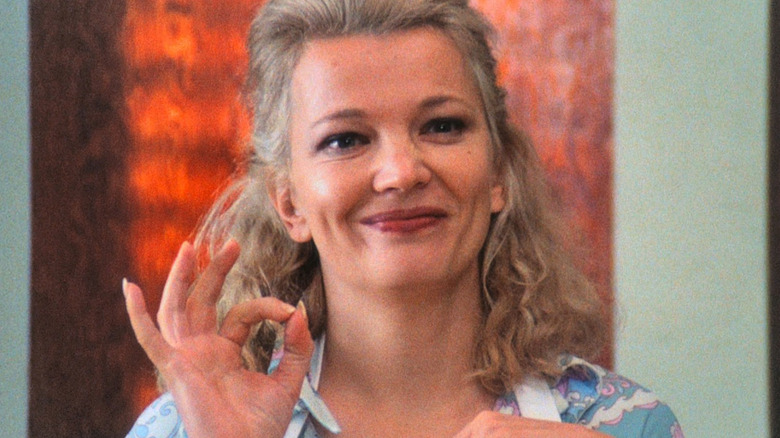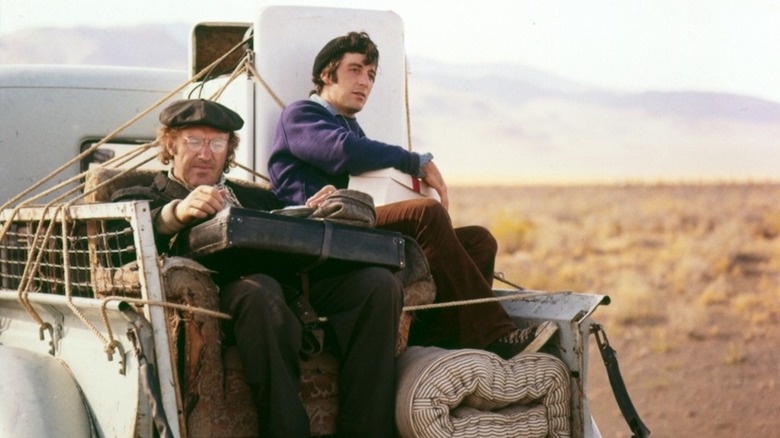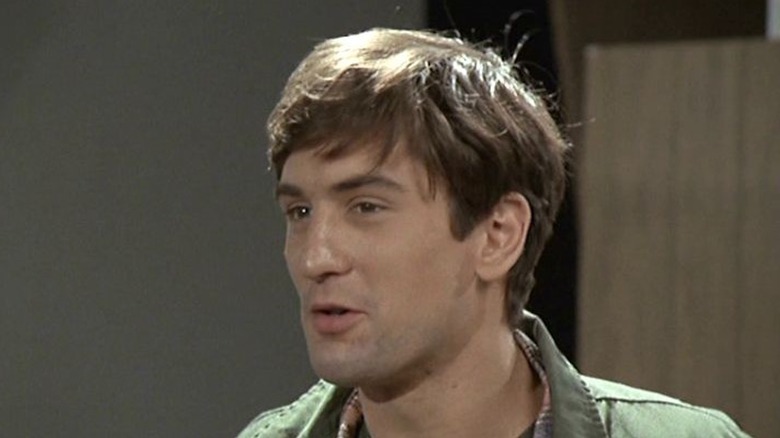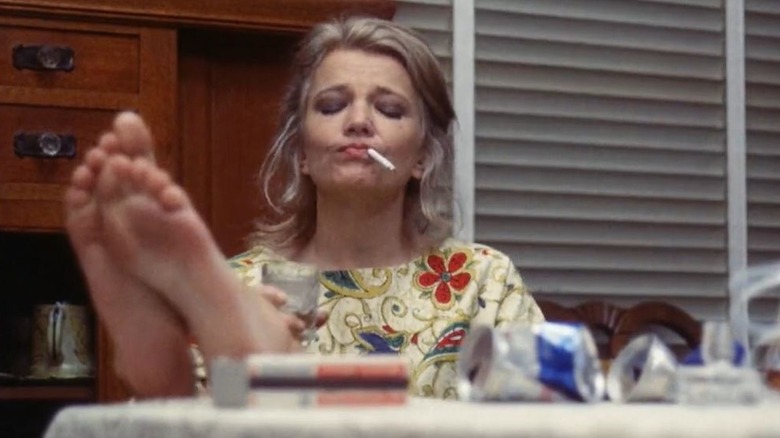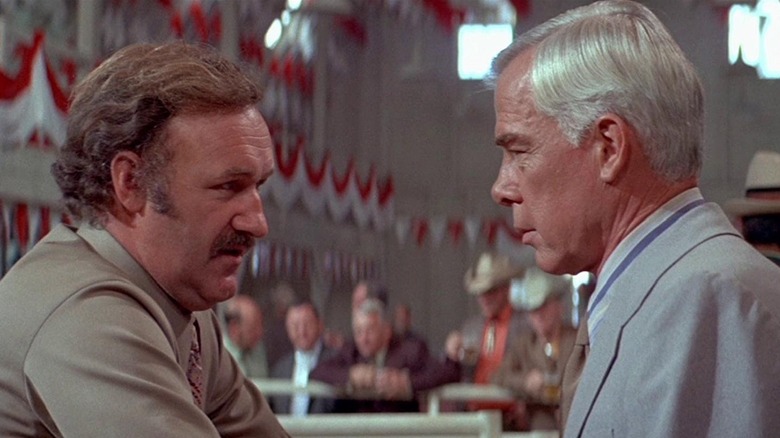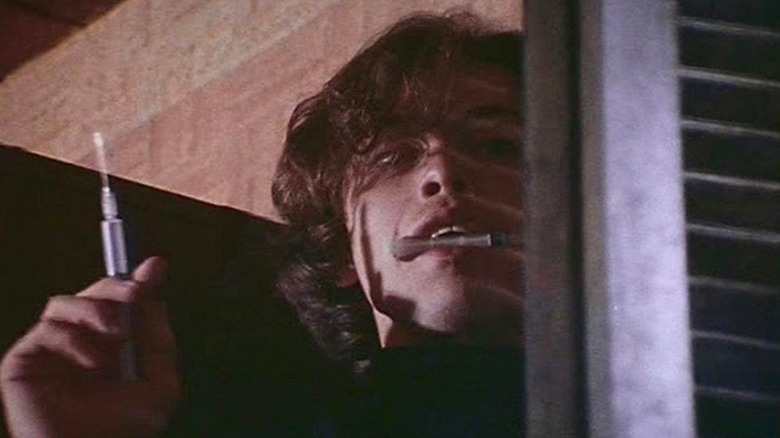'70s Movies Everyone Needs To Watch At Least Once
The 1970s were a time of turmoil and transformation in cinema. Given the state of the world, how could they not be? The United States was diligently destabilizing the world, fighting a pointless war in Vietnam, and propping up dictators in countries like Chile and Iran. The Watergate scandal drove President Richard M. Nixon from office. There was an energy crisis. Elvis Presley died.
There was also a changing of the filmmaking guard underway. Hollywood's golden age maestros were passing the baton to brash new talents like Francis Ford Coppola, Martin Scorsese, and Steven Spielberg, while moviegoers who'd been raised on the maturing medium were hungry for convention-shattering entertainment. This meant there was, however briefly, room for mainstream directors and mavericks. The latter won out, of course, but we got some unbelievably great movies out of it.
You already know the must-sees: "The Godfather," "Jaws," "Taxi Driver," "Network," "The Exorcist," and so on. But if you're just now getting curious about this era, there are loads of gems that are every bit as essential as the aforementioned classics. These films are 100% auteur driven; they resist established formulas in order to explore the kinds of offbeat stories and idiosyncratic characters Hollywood typically ignores. I could rattle off recommendations all day, but here are five movies from this tumultuous decade that you need in your life.
Scarecrow (1973)
Al Pacino and Gene Hackman only worked together once (and, per the former, given their very different approaches to their craft, it wasn't an easy experience), but they made their sole collaboration count in Jerry Schatzberg's shaggy tale of two temperamentally opposite drifters wending their way from California to Pittsburgh, where they hope to start a car-wash business. Pacino's yappy Lion initially grates on Hackman's Max, but he's gradually won over by the ingratiating dork, himself determined to restart his life with his wife and their five-year-old son (from whom he was separated while he worked as a sailor).
Nothing goes as planned. The two end up in a prison work camp for a month, which drastically changes the dynamic of their relationship. The more time we spend with Lion, the more we suspect he's not being straight-up about his circumstances. Max ultimately realizes Lion would be lost without him and drops his stern guard as a means of getting his fragile newfound pal to Pittsburgh in as close to one piece as possible.
The film is a fascinating, stripped-down echo of Dennis Hopper's New Hollywood provocation "Easy Rider;" Max and Lion are hoofing their way across the country in zero style, searching for a modest slice of the American Dream. They're not accompanied by a banger-laden soundtrack, nor are they out to alter their consciousness with hallucinogenic drugs. Schatzberg and cinematographer Vilmos Zsigmond plop the characters in one seedy location after another, leaving us to wonder how either of these misfits will ever find their place. Garry Michael White's melancholy screenplay doesn't offer much in the way of hope, but it does give two of the greatest actors ever ample space to embody a pair of forgotten men.
Hi, Mom (1970)
Before Brian De Palma became a purveyor of pure cinema with masterpieces like "Sisters," "Carrie," and "The Fury" (all required 1970s viewing), he came on as a bomb-throwing satirist with the unruly duo of "Greetings" and "Hi, Mom!" Both vignette-driven films feature a pre-stardom Robert De Niro as experimental filmmaker Jon Ruben, an ultra-creepy voyeur who, in the latter film, clumsily tries his hand at making a pornographic movie. But while "Hi, Mom!" was prescient in anticipating the adult film trend that would take hold of the nation two years later with the release of "Deep Throat," the movie roars to life when Ruben joins a Black theater troupe working on a guerilla theater production called "Be Black, Baby!"
When I saw "Hi, Mom!" at a De Palma retrospective 24 years ago, this segment, in which the Black actors don whiteface and force white theatergoers to wear blackface, was met with gasps. I've shown this film to friends and acquaintances several times over the years, and the reaction is always the same. The troupe's performance becomes assaultive; they are out to traumatize their white audience in ways that pole vault the line. De Palma dials up the intensity to an unbearable degree until, finally, we're left with a caustically hilarious punchline. Whereas most white filmmakers were making self-congratulatory, we-solved-racism claptrap in the "Guess Who's Coming to Dinner" mold, De Palma went nuclear on this naive mindset. Sadly, "Be Black, Baby!" hits just as hard today. It's a scalding experience.
A Woman Under the Influence (1974)
John Cassavetes' "A Woman Under the Influence" is not an underrated gem, but I get the sense that it's a film most people have avoided due to its 147-minute runtime and reputation as a harrowing depiction of mental illness. Dear god, take the plunge. Gena Rowlands' portrayal of Mabel, the wife of lunkheaded construction foreman Nick (Peter Falk), will set your heart and would ablaze. You will experience a gamut of emotions that are not accessible to us mere, non-Rowlands mortals. And this is because Cassavetes and Rowlands, a real-life husband and wife, are communicating directly with each other, working through s***, and confronting true love as a flight of instability.
Until the whimsical final music cue, "A Woman Under the Influence" plays like a study of marital disaster. Mabel is losing touch with reality, and it seems like Nick, the kind of dope who, after missing a date night with his wife, will bring his entire work crew home in the morning for a spaghetti dinner. Mabel is overwhelmingly accommodating, but she's also flirty, which angers Nick. She's spiraling, but to what degree is Nick responsible for this? This tension builds and builds until it explodes in a moment where the lighting seems to strobe in response to Rowlands and Falk's supercharged performances. Rowlands was never better, but, then again, no actor's really ever been better. Want to bear witness to a volcanically great piece of acting? Watch "A Woman Under the Influence."
Prime Cut (1972)
After making his directorial debut in 1969 with the moody skiing film "Downhill Racer," Michael Ritchie blasted into the 1970s with a string of disparate classics. He shared Robert Altman's stoned, hang-back approach to comedy with "Smile" and "The Bad News Bears," but he was also a sharp satirist, as evidenced by the Robert Redford-fronted "The Candidate." If you've never seen these films, get on that posthaste. And when you've cleared those from your queue, treat yourself to 1972's "Prime Cut," a sui generis crime flick that finds mob enforcer Nick Devlin (Lee Marvin) going head to head with a sadistic butcher named Mary Ann (Gene Hackman).
The less you know about "Prime Cut" going in, the better. It was Hackman's first film after winning the Best Actor Oscar for "The French Connection," and, via the Marvin pairing, probably held commercial appeal for Paramount. Alas, the movie bombed and quickly became a footnote in the filmographies of all involved. Surprisingly, despite its compelling weirdness (Mary Ann has a penchant for making sausage out of his enemies) and terrific action sequences (including a chase that Buzz Kulik shamelessly ripped off for Steve McQueen's final movie, "The Hunter"), it hasn't acquired much of a cult following over the last 53 years. It's a sensational movie that deserves better.
Martin (1977)
George A. Romero is the undisputed godfather of the zombie movie, but his finest work as a filmmaker is the most inventive vampire film you'll ever see. Made for a paltry $250,000 in Pittsburgh, "Martin" stars John Amplas as a young man who drugs and rapes women before feasting on their blood. Is Martin a true vampire or a psychopath? Martin's Lithuanian Catholic cousin, Tata Cuda (Lincoln Maazel), believes so and gives the troubled youth room and board so as to keep a close eye on him, promising that if Martin murders anyone in their suburb of Pittsburgh, he will drive a stake through his heart.
Romero made this film a year prior to scoring a box office bonanza with "Dawn of the Dead," and it marked the end of an endearingly scrappy run of heady horror movies that included "Season of the Witch" and "The Crazies." There's a steel-country sleaziness to "Martin" that seeps into your bones; everything looks cheap and dirty, and this aesthetic is further debased by Martin's crude syringe-and-razor-blades approach to vampirism. There's a prevailing, stomach-turning sense of disease hanging over the film. And then there's Martin's talk radio addiction: Every night, he calls in to a local DJ's show to share his mania. The host dubs him "The Count" and turns him into a cult celebrity. Romero hits a lot of bases with "Martin."
